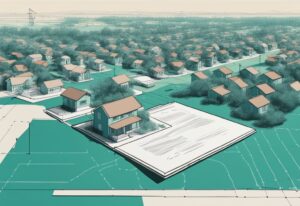
Are you aware of the grandfather clause in real estate and how it might affect your property value? As a seasoned real estate expert, I’ve seen the benefits this provision offers homeowners, property investors, and real estate professionals alike. It preserves certain rights, often protecting property use against ever-changing zoning laws.
In this article, I’ll break down the complexities of the grandfather clause, shedding light on its intricacies and advantages. You’ll gain a deeper understanding of its potential impact on your property’s market potential, and how to skillfully navigate through.
Ready to safeguard your property and enhance its worth? This guide offers the insights you need. Let’s dive in and explore how the grandfather clause can fortify your real estate interests.
What is the Grandfather Clause in Real Estate?
An Introductory Definition
The grandfather clause in real estate is a fascinating legal provision. It allows property owners to keep their existing rights and privileges, even if new regulations or zoning laws are introduced. Imagine having a small family-run grocery store that’s been around for decades. If the city decides to change the zoning laws, your store can still operate as usual thanks to this clause. Historically, the notion of the grandfather clause started after the Civil War, aimed at exempting certain individuals from new voting requirements. Over time, its use has expanded to safeguard property rights, ensuring that properties can continue their existing use despite any new regulations.
The Concept of Legal Non-Conforming Use
In the real estate world, you might hear the term “legal non-conforming use” quite a bit. This concept is crucial because it allows properties that were established before the new zoning laws or building codes to continue their existing use, even if they don’t follow the new rules. Think about it this way—it’s like being grandfathered into a club where the rules have changed, but your membership remains valid.
Municipal zoning bylaws are key here, as they determine which properties qualify for this legal non-conforming use, and understanding the broader implications of zoning can be crucial for property owners. For more information on zoning laws and regulations, visit this resource on zoning. Local governments assess these properties based on specific criteria and conditions laid out in these bylaws. This way, there’s a smooth transition between honoring historical uses and complying with modern regulations. For property owners, this framework is invaluable, as it strikes a balance between tradition and progress, ensuring that their investments remain protected.
So, when you hear about the grandfather clause in real estate, remember that it’s all about preserving the established ways amidst a sea of new rules and regulations. It’s a nod to the past while navigating the present, offering property owners a form of continuity and reassurance.
Advantages of the Grandfather Clause
The advantages of the grandfather clause in real estate span several key areas, benefiting property owners in protecting their rights, preventing fines, and potentially enhancing property value. These benefits can make a significant difference in your real estate investments.
How It Protects Your Property Rights
The grandfather clause in real estate serves as a powerful protector of property rights, enabling homeowners to retain their property’s pre-existing use despite newly enacted zoning changes. Imagine owning a charming old home with unique architectural features that stand out in the neighborhood. Newly introduced building codes demand changes that threaten those very features. Thanks to the grandfather clause, you can preserve your home’s character without jumping through hoops to meet those new regulations.
Another scenario might involve running a bustling family-owned business in an area that’s just been reclassified as residential. The clause allows you to continue operations without relocating or shutting down. This provision offers a significant level of security, ensuring continuity and stability for property owners. The cost and disruption of adapting to new regulations can be avoided, keeping your property as you’ve always known it. For property investors, understanding concepts like accelerated depreciation in real estate is essential to maximize tax benefits and financial planning.
Preventing Fines and Penalties
One of the most practical advantages of the grandfather clause in real estate is its role in shielding homeowners from fines and penalties associated with non-compliance with new regulations. Think about an old apartment building that has been standing for decades, providing homes to many. Now imagine new laws are introduced requiring an expensive overhaul of its structure. Properties with grandfathered status are exempt from adhering to these new laws, even if their current use violates them.
This legal shelter means that property owners can continue their operations uninterrupted, without the looming threat of penalties or enforcement actions. For older properties, this exemption is particularly crucial. They might not meet modern building codes but have been safely utilized for years without incident. As a result, owners can sleep soundly, knowing their properties won’t suddenly become financial burdens.
Implications for Your Property’s Value
The grandfather clause in real estate can also have favorable implications for a property’s market value.
Properties with grandfathered rights often attract higher valuations because of their unique status and exceptions to certain zoning laws. Buyers and investors may place a premium on these properties due to the continuity of their uses and potential cost savings from avoided compliance expenses.
Consider a commercial property that doesn’t need to comply with new restrictions placed on similar properties nearby. Its enduring use under older, less restrictive regulations can enhance its market appeal. Potential buyers see not just a building, but an opportunity unhampered by modern constraints. As a result, properties with grandfathered rights can often command a higher price, offering a substantial benefit to current owners looking to sell.
Grandfathered Property Rights: Practical Examples
Commercial Use in Domestic Zones
When we talk about the grandfather clause in real estate, one common scenario that comes to mind is businesses operating in residential areas. Imagine a cozy little bakery that started serving delicious treats in your neighborhood long before new zoning laws came into place, banning commercial activities. Thanks to the grandfather clause, that bakery can keep its doors open. It’s about maintaining economic activities without disruption. This continued operation is a direct result of the grandfather clause in real estate, preserving the business’s viability despite new zoning restrictions.
Navigating Non-Conforming Building Dimensions
Another fascinating example of the grandfather clause in real estate is properties with dimensions that don’t quite fit current zoning regulations. Picture a charming old house built decades ago, sitting happily where it is. Now, even if new laws say homes need to be a certain distance from property lines, this home can stay just where it is. The same goes for buildings that exceed new height restrictions—they can keep their original structures. This way, property owners don’t have to break the bank making alterations to meet new rules, protecting their investments and the buildings’ structural integrity.
Maintaining Legacy Commercial Operations
The grandfather clause in real estate is also a hero for legacy commercial operations. Think about a family-owned hardware store that’s been part of the community for generations. Even if new zoning regulations come into play, this store can continue doing business as usual. This protection is crucial for businesses with long-standing ties to their locality, allowing them to maintain their operations without falling foul of new rules. The grandfather clause in real estate ensures stability and continuity, sparing businesses from the economic and logistical nightmares of forced compliance. Understanding various property rights, such as littoral rights in real estate, can further enhance a business’s ability to navigate complex local regulations successfully.
These practical examples show just how the grandfather clause in real estate safeguards property rights and fosters economic stability. It’s all about allowing both residential and commercial properties to flourish, even as regulations evolve.

Understanding the Legal Support and Basis
Let’s break down the legal framework that supports the grandfather clause in real estate. This foundation is crucial in safeguarding property owners’ rights amidst evolving regulations.
The Fifth Amendment and Real Estate
The Fifth Amendment, particularly its just compensation clause, plays a pivotal role in the grandfather clause in real estate. Essentially, this ensures that when the government takes private property for public use, they must provide fair compensation to the property owner. Imagine you have a property that’s been in your family for generations; this legal backing protects its integrity, ensuring you are fairly treated.
When new zoning laws come into play, property owners with grandfathered rights often find a safety net because any significant change to their existing property use would require just compensation from the government. This constitutional safeguard forms a fundamental support structure for grandfather clauses in real estate, emphasizing fair treatment of property owners when regulations shift.
How Municipal Zoning Bylaws Apply
Municipal zoning bylaws are vital in determining whether a property is eligible for grandfathered rights. Local governments set specific criteria and conditions that recognize and maintain these rights. For example, these bylaws could outline the importance of the property’s continuous use and detail how pre-existing uses are protected from new regulations.
By interpreting and applying these bylaws, local authorities can identify properties that qualify for grandfather clauses, ensuring these properties are safeguarded from new zoning laws. This nuanced system balances development needs with property owners’ rights, allowing for a harmonious approach to urban planning.
State and Local Rules
State and local regulations massively influence how grandfathered rights are applied and preserved. These rules can vary significantly, shaping the recognition and upkeep of grandfather clauses. Local ordinances often lay out detailed conditions, such as the types of property use that qualify and the documentation needed to prove grandfathered status.
This variability means that property owners must stay well-informed about both state and local laws to ensure their rights are protected. Legal nuances at these levels provide a framework within which grandfather clauses operate, underscoring the importance of understanding local legal landscapes. By adhering to these regulations, property owners can more adeptly navigate the complexities of maintaining grandfathered status, ensuring their longstanding property uses remain secure.
Grandfather Clause vs. Variance: What’s the Difference?
The “grandfather clause in real estate” and variance are two legal mechanisms that can impact property usage, but they operate quite differently. Understanding these differences can help property owners navigate zoning laws effectively.
Key Contrasts
The grandfather clause in real estate is essentially a safeguard that allows properties to retain their existing usage despite new zoning laws. Imagine you own a charming little café in a neighborhood that later changes its zoning to residential-only. Thanks to the grandfather clause, you can keep brewing coffee and serving pastries, even though new regulations say it shouldn’t be possible.
In contrast, a variance is like asking for special permission. If your property usage doesn’t meet current zoning laws and isn’t protected by a grandfather clause, you may need to request a variance. This involves showing that the strict application of zoning laws would cause you significant hardship. It’s a more complex process, requiring approval from a zoning board after they meticulously review your case.
Choosing the Right Legal Strategy
So, which route should you take? Well, if your property has been used in a particular way before the new zoning laws came into effect, relying on the grandfather clause in real estate is a straightforward approach. But if the grandfather clause doesn’t apply, seeking a variance might be your best bet.
Consulting with a legal advisor is crucial here. They can help you assess whether you should pursue protection under the grandfather clause or apply for a variance. This kind of guidance ensures you’re well-informed and making the best decision for your property. It’s all about understanding your rights and the most effective strategies for compliance with local zoning laws.
Dealing with Grandfathered Rights
When it comes to navigating the complexities of grandfathered rights in real estate, there are several aspects you need to be aware of. This guide delves into the critical steps potential property buyers should take, the importance of legal advice, and how to document property history effectively.
Steps for Potential Property Buyers
Acquiring a property with grandfathered rights involves meticulous research to ensure you understand its zoning history and any existing grandfathered status.
First, conduct thorough due diligence by examining property records. Municipal archives often hold vital zoning histories and any records of use changes. Additionally, you should consult local authorities like the city or town planning office. They can provide insights into current zoning regulations and whether the property is grandfathered under any previous bylaws. Reviewing title reports is also critical. These documents often detail any legal stipulations or historic zoning decisions that could affect the property.
Why Getting Legal Advice is Crucial
Obtaining legal guidance is indispensable when dealing with grandfathered rights under the grandfather clause in real estate. A real estate attorney can help interpret complex zoning laws and clauses. This ensures you understand the full implications of any grandfathered statuses associated with the property.
This expertise can prevent costly misunderstandings or legal repercussions that may arise from non-compliance with existing or new regulations. Understanding concepts such as avulsion in real estate can be crucial for property transactions. An attorney can also assist in asserting these rights legally if contested. Having someone on your side who understands the nuances of real estate law can make a significant difference.
How to Document Property History
Accurate documentation of the property’s history, including its uses, structural changes, and any grandfathered rights, is essential for maintaining and asserting these rights.
Begin by compiling records of the property’s use over time. Historical zoning maps, building permits, and land use documents can serve as critical evidence. Additionally, photographs and other forms of tangible proof showcasing the property’s longstanding use under the grandfather clause in real estate are valuable.
Consistent and detailed record-keeping not only helps in asserting grandfathered rights but can also provide protection against future legal challenges.

Navigating Legal Disputes and Controversies
The legal landscape surrounding grandfather clauses in real estate can be tricky, often leading to disputes and controversies. Understanding the common issues and developing proactive strategies to manage risks is crucial for property owners wanting to safeguard their rights effectively.
Common Issues and How to Address Them
Disputes over the grandfather clause in real estate often revolve around interpreting and defining the scope of grandfathered rights. Imagine neighbors or local communities challenging the continued, non-conforming use of a property. These disputes can escalate into legal battles over whether a property’s use is genuinely exempt from new zoning laws.
So, how do you address these issues? A proactive approach is essential. Consult legal experts specializing in real estate and local zoning laws. Retaining all relevant documents—property records, historical usage data, and more—can substantiate your claims and help navigate these disputes effectively.
Proactive Risk Management Strategies
Managing risks related to the grandfather clause in real estate effectively requires comprehensive due diligence and proactive planning. Let’s explore a few strategies:
- Engage in Thorough Due Diligence: Research your property’s history, local zoning bylaws, and any changes in regulations. Understand how these factors impact the grandfathered rights of your property.
- Seek Legal Advice: Consult with real estate attorneys who can provide expert guidance on maintaining and asserting your grandfathered rights. Their advice can be invaluable in navigating complex legal challenges and potential disputes.
- Proactively Plan for Regulatory Changes: Stay updated on local legislative developments. Prepare for regulatory changes by documenting the historic use of your property and understanding how new laws might affect your grandfathered rights.
- Maintain Accurate Documentation: Keep detailed records of your property’s use, zoning history, and any communications with local authorities. This documentation is crucial for demonstrating compliance and asserting grandfathered claims effectively.
By implementing these strategies, property owners can better manage potential disputes and ensure the preservation of their grandfathered rights.
Exploring the Historical Context of Grandfather Clauses
The grandfather clause is rooted in significant historical moments and has evolved to play a crucial role in real estate, shaping property rights and market stability.
The Reconstruction Era and Initial Uses
The concept of a grandfather clause emerged during the Reconstruction Era in the Southern United States. Initially, it served as a legal provision to exempt certain individuals from new restrictive laws aimed at disenfranchising African American voters. By allowing pre-existing voting rights to remain intact, these clauses effectively maintained the status quo for white voters while circumventing new legislation imposed in the post-Civil War period.
Evolution Towards Real Estate Property Rights
Over time, the applicability of the grandfather clause expanded beyond social and voting regulations to encompass real estate and property rights. This evolution allowed property owners to retain the use and features of their properties as they existed before the implementation of new regulations.
Consequently, properties with grandfathered status can continue operations and maintain characteristics that new zoning laws would otherwise prohibit. This provides significant protection and stability in the real estate market by safeguarding investments from sudden regulatory changes.
Case Studies from History
Several legal cases highlight the interpretation and impact of the grandfather clause in real estate:
- Palmer/Sixth Street Properties, L.P. v. City of Los Angeles (2009): This case centered around the application of rent control ordinances and how they affected pre-existing property rights. The court’s decision underscored the importance of grandfathered rights in protecting property owners from abrupt legal changes.
- Yost v. City of Berkeley (2019): Another pivotal case, it examined the scope of non-conforming uses under new zoning regulations. The court upheld the significance of grandfathered clauses, allowing properties to maintain their original use despite newly enacted zoning laws.
These cases reflect how the grandfather clause continues to serve as a critical legal mechanism for preserving property rights amidst evolving regulatory landscapes.
Constraints and Limitations of the Grandfather Clause in Real Estate
The grandfather clause in real estate provides unique protections, but it’s crucial to understand its constraints and limitations. Each subsection here delves into important aspects you need to be aware of to navigate these rights effectively.
Maintaining Grandfathered Rights: A Checklist
Ensuring the continued benefits of a grandfather clause in real estate demands diligent effort and attentiveness to detail. Here’s a practical checklist to keep you on the right track:
- Keep the Property’s Use Unaltered: Make sure the property’s use remains the same as when the grandfathered rights were first established. Any changes could put these rights at risk.
- Regularly Review Local Ordinances: Stay on top of new regulations that might impact your property. This helps preclude inadvertent violations of evolving local laws.

Compliance with these laws is non-negotiable. Continuous monitoring and regular reviews are key to safeguarding your grandfathered rights.
Understanding the Non-Absolute Nature of These Rights
Although the grandfather clause offers significant protections, it’s vital to remember that these rights are not all-encompassing. Have you ever wondered how certain changes can still affect grandfathered rights? Consider the following:
- Safety Upgrades: New building codes that mandate safety upgrades might still apply to your property, regardless of its grandfathered status.
- Legal Requirements: Changes in legal requirements, such as environmental regulations, may also impose new obligations.
Understanding these nuances helps ensure you don’t assume broader protections than what the law actually provides. It’s essential to stay informed and seek clarity whenever there’s uncertainty.
Navigating the Legal Complexity
The legal landscape surrounding grandfathered rights in real estate is intricate. Ongoing diligence and professional legal advice are indispensable tools for property owners:
- Regular Consultation: Engage with real estate attorneys who are knowledgeable about local zoning laws and regulations.
- Proactive Approach: Adopt a proactive stance by scheduling regular legal check-ins and maintaining thorough documentation. These strategies are crucial for not only upholding your rights but also managing potential risks.
Such an approach helps you navigate the complexities effectively, ensuring your grandfathered rights are well-maintained.
FAQ: Everything You Need to Know About the Grandfather Clause
The concept of a grandfather clause is crucial in understanding property rights and zoning regulations. These subheadings dive into the benefits, the process of verifying rights, potential impacts of new regulations, and the conditions that might lead to losing grandfathered rights.
What benefits do property owners get from the grandfather clause?
The grandfather clause in real estate provides property owners with significant advantages. For instance, it protects against new zoning laws, letting you use your property as you always have, even if new regulations come into play. This continuity can lead to an increase in property value, making your property more attractive in the market. It’s like having a golden ticket that preserves the status quo against changing rules.
How do you know if a property has grandfathered rights?
Figuring out if your property has grandfathered rights involves a bit of detective work. Start by consulting local ordinances and zoning statutes. The property’s zoning history and records will be your best friends here, offering concrete evidence of pre-existing rights. To be absolutely sure, seeking legal advice is a smart move. A professional can confirm the status and help you navigate any legal complexities involved.
What happens if a new regulation affects my grandfathered rights?
New regulations can sometimes challenge grandfathered rights. If this happens, it’s crucial to act swiftly. Legal advice is essential in understanding your standing. Do you need to assert your rights legally? Or maybe applying for a variance will be necessary? Quick action can help protect your interests and make sure your grandfathered rights remain intact.
Can grandfathered rights be lost?
Yes, grandfathered rights can definitely be lost. A change in property use, abandonment, or violations of conditions set by local ordinances can all result in losing these rights. Non-compliance with new safety or legal requirements also poses a risk. It underscores the importance of ongoing compliance with current laws. Regular reviews and understanding of regulations will help you keep those grandfathered rights secure.
Conclusion
The concept of the grandfather clause in real estate is a pivotal mechanism that provides property owners with significant protections from new regulations. Its primary function is to safeguard the pre-existing use of properties, allowing them to continue operations or maintain structures that no longer comply with updated zoning laws or building codes. However, while beneficial, these clauses come laden with intricate legalities that require meticulous understanding.
Navigating the grandfather clause in real estate involves numerous challenges and complexities. To ensure property owners can effectively use these provisions, it’s crucial to be well-informed about the property’s zoning history, current municipal bylaws, and potential changes in regulations that may impact grandfathered rights.
Maintaining detailed and accurate documentation of property use and any grandfathered status is essential in asserting and preserving these rights.
Professional legal advice is indispensable when dealing with grandfather clauses. Lawyers specializing in real estate law can offer valuable guidance, helping property owners understand their rights, avoid potential pitfalls, and address any disputes or compliance issues that may arise. Legal support is especially important when interpreting local and state regulations, which can vary significantly, affecting the application and preservation of grandfathered rights.
In conclusion, while the grandfather clause in real estate offers critical protections that can potentially enhance property value, it demands a thorough comprehension of the associated legal framework. With the right knowledge and professional advice, property owners can successfully navigate these provisions and secure the continued use and value of their properties.






